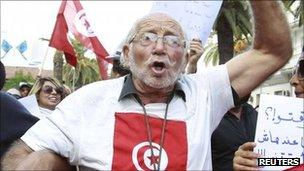Q&A: Tunisia elections
- Published

Some Tunisians are worried that Islamist parties could win a majority
Tunisian voters head to the polls on 23 October to vote in the first comprehensive general election to emerge from the "Arab Spring" - this year's pro-democracy protests in North Africa and the Middle East.
The elections follow the ousting of President Zine al-Abidine Ben Ali and his Democratic Constitutional Rally (RCD) this January, after 23 years in power.
Voters will choose representatives for the new Constituent Assembly which will draw up a new constitution and appoint a new transitional government until further elections return a permanent government.
Why are these elections significant?
The elections are hugely significant in Tunisia because of the almost unfettered remit of the Assembly and the influence this will have on Tunisia's political future.
It is also of huge interest to outside observers and other Arab states with democratic ambitions of their own. A free, fair and peaceful election is likely to further encourage democratic movements in Syria, Yemen, Bahrain and elsewhere.
External powers will also be keeping a keen eye on Tunisia's future political make-up, particularly the performance of Islamist parties. Tunisia has been run by a transitional government since the overthrow of Mr Ben Ali.
What will the Assembly do?
The Constituent Assembly will have a one-year mandate to draft a constitution.
It is free to decide how it goes about drafting the constitution and whether it will subject it to a referendum.
The original constitution, dating from 1959, was heavily weighted in favour of the president.
The Assembly is also expected to appoint the transitional government of the country for the duration of its term.
How do the elections work?
Voters are choosing 217 members for the Constituent Assembly.
Of these, 199 seats will be contested in 27 constituencies in Tunisia and 18 seats will be marked for Tunisians abroad voting in six overseas constituencies.
Under the system of proportional representation, individual parties have already stated in which order their candidates will take up the party's share of the seats in each constituency. Half the candidates on each list must be women.
What are the main parties?
Ennahdha, external (The Renaissance) is an Islamist party which is widely acknowledged as having the largest support network and public profile of all the Tunisian parties. It is expected to win the largest number of seats.
Ennahdha was previously banned under Mr Ben Ali, and its leader, Rached Ghannouchi, recently returned home from 20 years in exile in the UK. Mr Ghannouchi has said that his party would "respect democracy and modernity", adding that his movement was one that could "find a balance between modernity and Islam".
He also promised to show tolerance towards "women's equality and liberal moral attitudes". Tunisia is considered one of the most liberal Arab countries, with high levels of female participation in public and political life.
The Progressive Democratic Party, external (PDP) is the most well-established secular party and was one of the few that were legal under Mr Ben Ali. Its founder and spiritual leader, Naguib Chebbi, has been Tunisia's regional development minister since January.
He had been barred from running in the 2009 presidential elections. The party, which describes itself as social-democratic, has been less than enthusiastic about the prospect of sharing power with Ennahdha but has not rejected it outright.
The Democratic Forum for Labour and Liberties, external, or Ettakatol, is a social democratic party which has been gaining ground in recent weeks and is now almost level with the PDP in the opinion polls. Its leader, Mustafa Ben Jafar, was briefly health minister this year.
Ettakatol was founded in 1994 but did not become a legally registered party until 2002. Its stated core values are transparency and openness and the party has said it is willing to form coalitions with other democratic parties.
How have the media covered the elections?
The Higher Independent Authority for the Elections, external (ISIE) has banned "comments and journalistic analyses directly or indirectly related to the elections" although political commentary is still appearing in Tunisian papers. The commission said the ban was due to the "lack of a legal framework regulating the running of opinion polls of a political nature".
Tunisia's independent media reform body, the National Council for Media and Communication Reform, pushed the interim government to pass two new decrees before the election to guarantee free and fair coverage. Political advertising has been banned since 12 September.
Who is monitoring the elections?
Because of the significance of these elections and the widespread belief that transgressions occurred in previous ones, there will be a large internal and external observer presence.
Formal Tunisian observation efforts will be organised by the Higher Independent Authority for the Elections, external (ISIE) but a number of civil society-led initiatives have also emerged. International elections observers include an EU mission as well as two US organizations, the Carter Centre and the Republican Institute.
Both organizations were considered controversial by Tunisians as both oversaw elections in Iraq and Afghanistan where wide irregularities were reported. ISIE chief Kamel Jendoubi says there will be about 5,000 election observers in total, with over 1,000 of them being foreigners.
Have the elections gone smoothly so far?
The elections were delayed by three months because of voter registration issues which saw 400,000 Tunisians with outdated ID cards unable to register in time.
Voter registration turnout for the October election has still been lower than expected. After the initial registration period was extended, 3,882,727 Tunisians - around 55% of the total number of Tunisians eligible to vote - were registered.
Eventually it was decided that domestic voters, including those who had not registered, could vote with their ID cards on the day.
BBC Monitoring, external selects and translates news from radio, television, press, news agencies and the internet from 150 countries in more than 70 languages. It is based in Caversham, UK, and has several bureaux abroad.